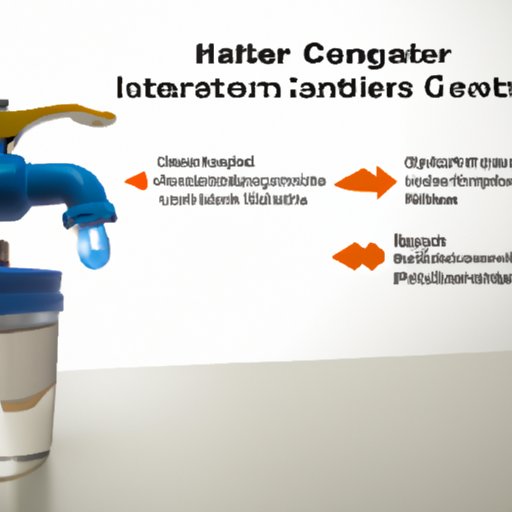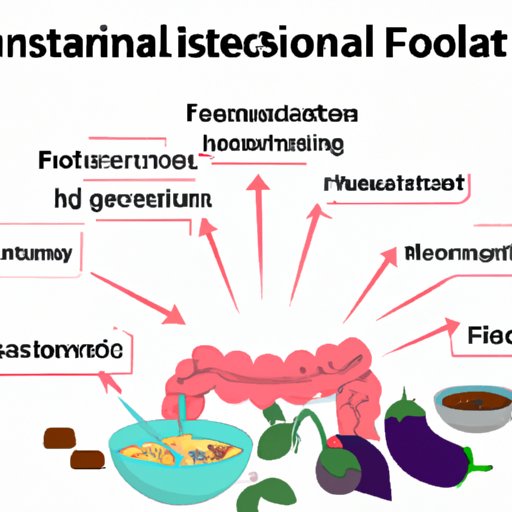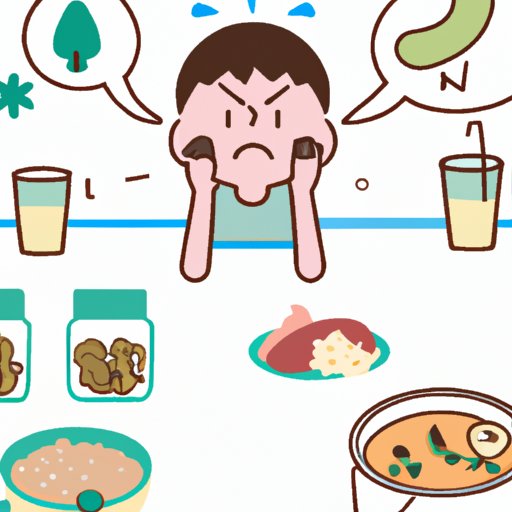Introduction
Constipation is an extremely common digestive issue that affects millions of people across the globe. Unfortunately, it can be particularly troublesome while traveling. Whether you’re going on a short weekend getaway or a longer international vacation, constipation can make your trip much less enjoyable. In this article, we will discuss some of the most common causes of constipation while vacationing and explore potential strategies for preventing it.

Examining the Role of Diet Changes on Constipation While Traveling
One of the primary reasons people experience constipation on vacation is due to dietary changes. Eating different types of food or meals than usual can throw off the delicate balance of your digestive system. The following are just a few ways in which dietary changes can lead to constipation while traveling.
Impact of Unfamiliar Foods
When you travel abroad, you may have the chance to try out new cuisine. This can be a great opportunity to expand your culinary horizons and sample dishes from around the world. However, it could also lead to digestive issues like constipation if your body isn’t used to digesting the ingredients in these meals. Eating too much of one type of food can also cause constipation, as can consuming excess fat or sugar.
Limiting Processed Foods
It can be tempting to indulge in processed snacks and fast food while away from home. But this type of fare is usually low in fiber and high in unhealthy fats, both of which can contribute to constipation. If you’re eating out often, try to choose restaurants that offer healthier options.
The Benefits of Eating Fiber-Rich Foods
Eating more fiber-rich foods can help prevent constipation while traveling. According to a study published in Frontiers in Nutrition, “Fiber is essential for regular bowel movements and helps to keep the intestinal tract healthy.” Try to incorporate more whole grains, fruits, and vegetables into your diet while on vacation. Additionally, drinking plenty of water will help keep your intestines well hydrated.
Exploring the Impact of Stress on Digestion During Vacations
Stress can also play a role in constipation while traveling. Stress has a direct impact on the digestive system, causing it to slow down or even shut down completely in some cases. This can lead to delayed digestion and, eventually, constipation. Here are a few tips for reducing stress while on vacation.
Effects of Stress on the GI Tract
When your body is in a state of stress, your brain releases hormones that can affect the muscles of your gastrointestinal (GI) tract. This can lead to symptoms such as abdominal cramping, bloating, and constipation. A study published in the journal Gut Microbes found that chronic stress can even cause changes in the bacteria in your gut, which can lead to further digestive issues.
Strategies to Reduce Stress
When you’re on vacation, it’s important to take time for yourself and relax. Take a few moments each day to focus on deep breathing exercises or simply sit and enjoy your surroundings. Additionally, engaging in physical activities like yoga or walking can help reduce stress levels and improve digestive health.
Investigating How Travel Can Affect Bowel Movements
Travel itself can also contribute to constipation. Being confined to a cramped airplane seat or car for long periods of time can cause the muscles of the GI tract to become sluggish. Additionally, motion sickness and jet lag can both have a negative effect on digestion.
Impact of Motion Sickness
Motion sickness is a common problem while traveling, especially when taking long car rides or flights. It can cause nausea, vomiting, and dizziness, all of which can lead to constipation. To reduce the risk of motion sickness, try to stay hydrated and avoid reading or looking at screens while in transit.
Influence of Jet Lag
Jet lag is another common issue that can lead to constipation. When you change time zones quickly, your body’s internal clock gets thrown off. This can cause fatigue, headaches, and digestive issues. To combat jet lag, try to adjust your sleep schedule to the new time zone several days before your trip. Additionally, drink plenty of water and limit your caffeine intake.

Analyzing the Connection Between Hydration and Constipation
Adequate hydration is also essential for avoiding constipation while traveling. Dehydration can cause your stools to become dry and difficult to pass. Here are a few tips for staying hydrated while away from home.
Adequate Fluid Intake
Make sure to drink plenty of fluids throughout the day while on vacation. Water is the best choice, but other beverages such as unsweetened herbal teas, low-fat milk, and 100% fruit juices are also hydrating. Aim to drink at least 8 cups of fluid per day to ensure sufficient hydration.
Avoiding Dehydrating Beverages
Alcohol and caffeinated drinks can actually cause dehydration and should be avoided if possible. These beverages can also irritate the lining of your stomach and intestines, leading to further digestive issues. Stick to non-caffeinated and non-alcoholic beverages whenever possible.

Understanding the Impact of Unfamiliar Foods on Intestinal Regularity
Finally, it’s important to understand how unfamiliar foods can affect your digestive system. Eating foreign dishes or trying out exotic ingredients can be exciting, but it can also lead to constipation if your body isn’t used to them. Here are a few tips for exploring international cuisine without risking digestive issues.
Prebiotic and Probiotic Foods
Incorporating prebiotic and probiotic foods into your diet can help promote healthy digestion. Prebiotics are fibers that feed the beneficial bacteria in your gut, while probiotics are live microorganisms that can help restore balance to your digestive system. Examples of prebiotic and probiotic foods include yogurt, kimchi, kefir, sauerkraut, miso, and tempeh.
Adopting an International Diet
Rather than focusing on individual dishes or ingredients, consider adopting an international diet. This means exploring the traditional cuisines of the places you visit and incorporating some of their staples into your daily meals. This can help you get used to the flavors and textures of the local foods, making it less likely that you’ll experience digestive issues.
Conclusion
Constipation can be a major issue while traveling, but there are ways to prevent it. By understanding the role of diet changes, stress, travel, hydration, and unfamiliar foods, you can take steps to keep your digestive system running smoothly. Eating more fiber-rich foods, drinking plenty of fluids, and limiting processed snacks can all help ward off constipation. Additionally, reducing stress and taking time to adjust to the local cuisine can help ensure that your vacation is an enjoyable one.
Summary of Key Points
Constipation is a common issue while traveling, and it’s important to understand its root causes. Dietary changes, stress, travel, hydration, and unfamiliar foods can all contribute to this problem. Eating more fiber-rich foods, drinking plenty of fluids, and limiting processed snacks can help prevent constipation. Additionally, reducing stress and taking time to adjust to the local cuisine can help ensure that your vacation is an enjoyable one.
Recommendations for Future Prevention
To prevent constipation while traveling, it’s important to maintain a healthy diet, stay hydrated, and limit stress. Incorporating prebiotic and probiotic foods into your diet can also help promote healthy digestion. Additionally, taking time to adjust to the local cuisine can help ensure that your vacation is an enjoyable one.
(Note: Is this article not meeting your expectations? Do you have knowledge or insights to share? Unlock new opportunities and expand your reach by joining our authors team. Click Registration to join us and share your expertise with our readers.)
